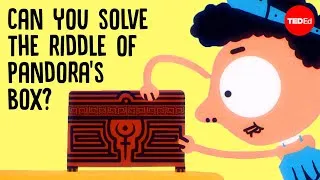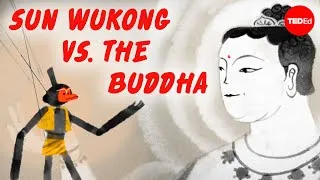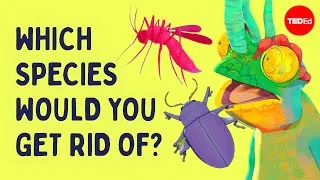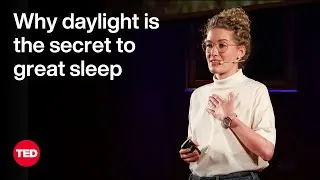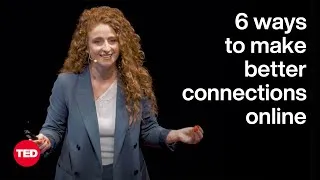請雙擊下方英文字幕播放視頻。
譯者: Wang-Ju Tsai
審譯者: Po-Chih Tsai
00:12
How do you feed a city?
0
12160
4000
如何餵飽一個城市的所有居民?
00:16
It's one of the great questions of our time.
1
16160
2000
這是現代一個大問題。
00:18
Yet it's one that's rarely asked.
2
18160
2000
但很少被提起
00:20
We take it for granted that if we go into a shop
3
20160
3000
就是很自然地, 當我們去商店
00:23
or restaurant, or indeed into this theater's foyer in about an hour's time,
4
23160
4000
餐廳,或一小時以後到戲院大廳
00:27
there is going to be food there waiting for us,
5
27160
3000
總有食物等待著我們
00:30
having magically come from somewhere.
6
30160
2000
神奇地出現
00:32
But when you think that every day for a city the size of London,
7
32160
5000
試想像倫敦這麽大的城市每天
00:37
enough food has to be produced,
8
37160
3000
要有足夠的食物被製造
00:40
transported, bought and sold,
9
40160
3000
運輸、買、賣
00:43
cooked, eaten, disposed of,
10
43160
4000
煮、吃、處置
00:47
and that something similar has to happen every day
11
47160
2000
同樣的事,日復一日
00:49
for every city on earth,
12
49160
2000
發生在每個城市裏
00:51
it's remarkable that cities get fed at all.
13
51160
3000
餵飽一座城市是相當不容易的
00:54
We live in places like this as if
14
54160
2000
對住在城市的我們
00:56
they're the most natural things in the world,
15
56160
3000
卻是稀鬆平常
00:59
forgetting that because we're animals
16
59160
2000
忘了我們也是動物
01:01
and that we need to eat,
17
61160
2000
我們也需要進食
01:03
we're actually as dependent on the natural world
18
63160
4000
我們還是依賴大自然而生
01:07
as our ancient ancestors were.
19
67160
2000
就跟我們老祖宗一樣
01:09
And as more of us move into cities,
20
69160
2000
隨著更多人遷入城市
01:11
more of that natural world is being
21
71160
3000
越來越多原始的大自然
01:14
transformed into extraordinary landscapes like the one behind me --
22
74160
3000
被開發成這樣壯觀的景色
01:17
it's soybean fields in Mato Grosso in Brazil --
23
77160
3000
這是在巴西馬托格羅索的大豆田
01:20
in order to feed us.
24
80160
3000
就為了餵飽我們
01:23
These are extraordinary landscapes,
25
83160
2000
這是十分壯觀的景色
01:25
but few of us ever get to see them.
26
85160
2000
但少有人見識過
01:27
And increasingly these landscapes
27
87160
2000
越來越廣大的田
01:29
are not just feeding us either.
28
89160
2000
卻不只用來餵飽我們
01:31
As more of us move into cities,
29
91160
2000
住城市的人越多
01:33
more of us are eating meat,
30
93160
2000
吃肉的人也越多
01:35
so that a third of the annual grain crop globally
31
95160
3000
每年全球的農作物有三分之一
01:38
now gets fed to animals
32
98160
2000
是拿去餵家畜
01:40
rather than to us human animals.
33
100160
2000
而不是直接給人吃
01:42
And given that it takes three times as much grain --
34
102160
4000
我們需要三倍的穀物
01:46
actually ten times as much grain --
35
106160
2000
事實上是十倍的穀物
01:48
to feed a human if it's passed through an animal first,
36
108160
3000
如果用家畜來餵飽人類的話
01:51
that's not a very efficient way of feeding us.
37
111160
5000
這是沒有效率的
01:56
And it's an escalating problem too.
38
116160
2000
而且是個日趨嚴峻的問題
01:58
By 2050, it's estimated that twice the number
39
118160
3000
到2050年住在城市的人
02:01
of us are going to be living in cities.
40
121160
2000
將是現在的兩倍
02:03
And it's also estimated that there is going to be twice as much
41
123160
2000
我們消費的肉與乳製品
02:05
meat and dairy consumed.
42
125160
2000
估計也會變兩倍
02:07
So meat and urbanism are rising hand in hand.
43
127160
5000
都市化和肉的消費量是共同增長的
02:12
And that's going to pose an enormous problem.
44
132160
2000
這將是個龐雜的問題
02:14
Six billion hungry carnivores to feed,
45
134160
3000
要餵飽六十億個肉食性動物
02:17
by 2050.
46
137160
4000
到2050年。
02:21
That's a big problem. And actually if we carry on as we are,
47
141160
2000
這是個大問題。如果我們不做改變
02:23
it's a problem we're very unlikely to be able to solve.
48
143160
3000
這個問題將會是無解
02:26
Nineteen million hectares of rainforest are lost every year
49
146160
4000
每年有一千九百萬公頃的熱帶雨林消失
02:30
to create new arable land.
50
150160
2000
被開發成農地
02:32
Although at the same time we're losing an equivalent amount
51
152160
3000
同時我們也失去同樣面積的可耕地
02:35
of existing arables to salinization and erosion.
52
155160
4000
因爲土地的鹽化和水土流失
02:39
We're very hungry for fossil fuels too.
53
159160
3000
再加上對石化燃料的索求無度
02:42
It takes about 10 calories to produce every calorie
54
162160
3000
在西方每製造一卡路里的食物
02:45
of food that we consume in the West.
55
165160
4000
要耗去十卡路里的能量
02:49
And even though there is food that we are producing at great cost,
56
169160
4000
雖然付出高昂的代價
02:53
we don't actually value it.
57
173160
2000
我們卻不珍惜
02:55
Half the food produced in the USA is currently thrown away.
58
175160
4000
半數在美國生產的食品是會被丟掉的
02:59
And to end all of this, at the end of this long process,
59
179160
3000
甚至,在這一長串過程的最後
03:02
we're not even managing to feed the planet properly.
60
182160
3000
我們也無法適當的分配食物
03:05
A billion of us are obese, while a further billion starve.
61
185160
5000
在地球上有十億人過胖,卻也有十億人吃不飽
03:10
None of it makes very much sense.
62
190160
2000
這一切都很不合理
03:12
And when you think that 80 percent of global trade in food now
63
192160
3000
試想全球百分之八十的食物交易
03:15
is controlled by just five multinational corporations,
64
195160
5000
只掌握在五大跨國公司的手上時
03:20
it's a grim picture.
65
200160
2000
這是可怕的情景
03:22
As we're moving into cities, the world is also embracing a Western diet.
66
202160
3000
當人們搬到城市住時,大家也接受了西方的飲食習慣
03:25
And if we look to the future,
67
205160
3000
如果我們想一想未來
03:28
it's an unsustainable diet.
68
208160
2000
這絕不是長久之計
03:30
So how did we get here?
69
210160
2000
那麽,我們是如何走到這一步的?
03:32
And more importantly, what are we going to do about it?
70
212160
3000
而更重要的是,下一步該怎麽走?
03:35
Well, to answer the slightly easier question first,
71
215160
4000
第一個問題稍微容易一些
03:39
about 10,000 years ago, I would say,
72
219160
2000
大概一萬年前,我想
03:41
is the beginning of this process
73
221160
2000
是這個演變的開始
03:43
in the ancient Near East,
74
223160
2000
在古老的近東
03:45
known as the Fertile Crescent.
75
225160
2000
又稱作“新月沃土”的地區
03:47
Because, as you can see, it was crescent shaped.
76
227160
2000
你可以看這像一輪新月的形狀
03:49
And it was also fertile.
77
229160
2000
這地區的土壤肥沃
03:51
And it was here, about 10,000 years ago,
78
231160
3000
大約在一萬年前,在這裡
03:54
that two extraordinary inventions,
79
234160
2000
有兩項非凡的發明
03:56
agriculture and urbanism, happened
80
236160
3000
農業以及城市的產生
03:59
roughly in the same place and at the same time.
81
239160
3000
大約在同一地點同一時間
04:02
This is no accident,
82
242160
2000
這並非偶然
04:04
because agriculture and cities are bound together. They need each other.
83
244160
4000
因爲城市和農業是分不開的。他們互相需要
04:08
Because it was discovery of grain
84
248160
2000
這起因於我們的祖先
04:10
by our ancient ancestors for the first time
85
250160
3000
第一次認識到穀物
04:13
that produced a food source that was large enough
86
253160
3000
可以產生足量又供給穩定的食物
04:16
and stable enough to support permanent settlements.
87
256160
4000
去支撐一個永久聚落
04:20
And if we look at what those settlements were like,
88
260160
2000
我們看看一些當時的聚落
04:22
we see they were compact.
89
262160
2000
他們的結構是緊密的
04:24
They were surrounded by productive farm land
90
264160
2000
他們的周圍有農田
04:26
and dominated by large temple complexes
91
266160
3000
並以一大型神殿為中心
04:29
like this one at Ur,
92
269160
2000
例如這一個在烏爾的神殿
04:31
that were, in fact, effectively,
93
271160
2000
在當時
04:33
spiritualized, central food distribution centers.
94
273160
3000
是神聖化的中央食物分配中心
04:36
Because it was the temples that organized the harvest,
95
276160
3000
因爲是神殿安排農作收割
04:39
gathered in the grain, offered it to the gods,
96
279160
2000
收集穀物獻給諸神
04:41
and then offered the grain that the gods didn't eat back to the people.
97
281160
4000
再把諸神沒吃的穀物發還給人們
04:45
So, if you like,
98
285160
2000
你可以這麽說
04:47
the whole spiritual and physical life of these cities
99
287160
2000
這些城市的精神及實體生活
04:49
was dominated by the grain and the harvest
100
289160
3000
是由他們賴以爲生的穀物和收成
04:52
that sustained them.
101
292160
3000
所支配
04:55
And in fact, that's true of every ancient city.
102
295160
3000
事實上,這對每一個古代的城市而言皆如此
04:58
But of course not all of them were that small.
103
298160
2000
當然,不是每一個城市都這麽小
05:00
Famously, Rome had about a million citizens
104
300160
3000
眾所皆知,在西元一世紀時
05:03
by the first century A.D.
105
303160
2000
羅馬就有將近一百萬的居民
05:05
So how did a city like this feed itself?
106
305160
4000
像這麽大的城市如何餵飽所有的居民?
05:09
The answer is what I call "ancient food miles."
107
309160
3000
答案就在我所謂的“古代食物道路”
05:12
Basically, Rome had access to the sea,
108
312160
3000
基本上,羅馬靠近海
05:15
which made it possible for it to import food from a very long way away.
109
315160
3000
所以食物可以從很遠的地方運來
05:18
This is the only way it was possible to do this in the ancient world,
110
318160
3000
這在古代非得透過海運才行
05:21
because it was very difficult to transport food over roads,
111
321160
3000
因為用陸運運輸是很困難的
05:24
which were rough.
112
324160
2000
路況很差
05:26
And the food obviously went off very quickly.
113
326160
2000
而且食物很快就壞掉
05:28
So Rome effectively waged war
114
328160
2000
所以羅馬有效地攻擊
05:30
on places like Carthage and Egypt
115
330160
3000
伽太基和埃及
05:33
just to get its paws on their grain reserves.
116
333160
2000
就爲了取得他們的存糧
05:35
And, in fact, you could say that the expansion of the Empire
117
335160
3000
事實上,整個羅馬帝國的擴張
05:38
was really sort of one long, drawn out
118
338160
3000
可說是一個長期有計劃的
05:41
militarized shopping spree, really.
119
341160
2000
軍事化的瘋狂大採購
05:43
(Laughter)
120
343160
2000
(笑聲)
05:45
In fact -- I love the fact, I just have to mention this:
121
345160
2000
事實上,我喜歡這個事實,我要指出
05:47
Rome in fact used to import oysters from London,
122
347160
3000
羅馬還曾經[從英國輸入牡蠣]
05:50
at one stage. I think that's extraordinary.
123
350160
2000
我覺得這就挺不簡單的
05:52
So Rome shaped its hinterland
124
352160
3000
可以說羅馬領土的形狀
05:55
through its appetite.
125
355160
2000
是由它的食欲來決定
05:57
But the interesting thing is that the other thing also
126
357160
2000
有趣的還有其他的事
05:59
happened in the pre-industrial world.
127
359160
2000
也發生在工業化前的世界
06:01
If we look at a map of London in the 17th century,
128
361160
3000
我們看這十七世紀的倫敦地圖
06:04
we can see that its grain, which is coming in from the Thames,
129
364160
3000
我們可以看到,穀物是從泰晤士河運入
06:07
along the bottom of this map.
130
367160
2000
在這張圖的下方
06:09
So the grain markets were to the south of the city.
131
369160
3000
所以穀物市場都是在市區的南方
06:12
And the roads leading up from them
132
372160
2000
這些路從穀物市場直指
06:14
to Cheapside, which was the main market,
133
374160
2000
到區普塞得,在當時是主要的市場
06:16
were also grain markets.
134
376160
2000
沿途也都是穀物市場
06:18
And if you look at the name of one of those streets,
135
378160
2000
你要是看這些道路的名字
06:20
Bread Street, you can tell
136
380160
3000
麵包街,你可以看出
06:23
what was going on there 300 years ago.
137
383160
3000
三百年前人們在這裡做什麽
06:26
And the same of course was true for fish.
138
386160
2000
漁獲的運輸也同理可證
06:28
Fish was, of course, coming in by river as well. Same thing.
139
388160
3000
魚當然是從河裏運來的
06:31
And of course Billingsgate, famously, was London's fish market,
140
391160
3000
比林斯門是過去倫敦有名的魚市場
06:34
operating on-site here until the mid-1980s.
141
394160
4000
一直到1980年代中期都還在使用
06:38
Which is extraordinary, really, when you think about it.
142
398160
2000
那真是很不可思議,真的,想像一下
06:40
Everybody else was wandering around
143
400160
2000
每個路人手裡
06:42
with mobile phones that looked like bricks
144
402160
2000
拿著磚頭大的大哥大
06:44
and sort of smelly fish happening down on the port.
145
404160
3000
還依稀聞到港口的魚腥味
06:47
This is another thing about food in cities:
146
407160
3000
這是另一個與城市、食物有關的事實
06:50
Once its roots into the city are established,
147
410160
3000
一旦運輸的進城路線被建立
06:53
they very rarely move.
148
413160
2000
就幾乎不會再改變
06:55
Meat is a very different story
149
415160
2000
肉類產品則是另外一回事
06:57
because, of course, animals could walk into the city.
150
417160
2000
因爲,動物們可以自己走進市内
06:59
So much of London's meat
151
419160
2000
所以倫敦的大部分肉品
07:01
was coming from the northwest,
152
421160
2000
是從西北方來的
07:03
from Scotland and Wales.
153
423160
2000
從蘇格蘭及威爾斯
07:05
So it was coming in, and arriving at the city at the northwest,
154
425160
3000
最後到達倫敦的西北方
07:08
which is why Smithfield,
155
428160
2000
那裡是史密斯菲爾德
07:10
London's very famous meat market, was located up there.
156
430160
3000
倫敦著名的肉市場, 便在那裏
07:13
Poultry was coming in from East Anglia and so on, to the northeast.
157
433160
4000
家禽類從東安格利亞進入倫敦的東北方
07:17
I feel a bit like a weather woman doing this. Anyway,
158
437160
1000
講到這裡我覺得好像在作氣象預報....
07:18
and so the birds were coming in
159
438160
4000
禽鳥類也這樣被運進來
07:22
with their feet protected with little canvas shoes.
160
442160
3000
腳上都套著帆布保護套
07:25
And then when they hit the eastern end
161
445160
2000
當牠們抵達區普塞得東邊時
07:27
of Cheapside, that's where they were sold,
162
447160
2000
就會被賣掉
07:29
which is why it's called Poultry.
163
449160
2000
所以這個地方就叫做“家禽區”
07:31
And, in fact, if you look at the map of any city
164
451160
3000
如果你細看任一城市地圖
07:34
built before the industrial age,
165
454160
4000
如果它在工業化前就存在
07:38
you can trace food coming in to it.
166
458160
2000
你就能追溯食物的道路
07:40
You can actually see how it was physically shaped by food,
167
460160
3000
切實地看出城市是如何被食物所改變
07:43
both by reading the names of the streets, which give you a lot of clues.
168
463160
3000
看一看街道的名稱,就可以給你很多線索
07:46
Friday Street, in a previous life,
169
466160
2000
星期五街,在以前
07:48
is where you went to buy your fish on a Friday.
170
468160
2000
是你在星期五去買魚的地方
07:50
But also you have to imagine it full of food.
171
470160
2000
想像街裏擠滿了食物
07:52
Because the streets and the public spaces
172
472160
3000
因爲在街上和公共空間
07:55
were the only places where food was bought and sold.
173
475160
3000
是買賣食物唯一的場所
07:58
And if we look at an image of Smithfield in 1830
174
478160
3000
看看1830年史密斯菲爾德當時的街景
08:01
you can see that it would have been very difficult to live in a city like this
175
481160
3000
你可以想見,住在這裡你很難不知道
08:04
and be unaware of where your food came from.
176
484160
2000
你的食物從哪裏來
08:06
In fact, if you were having Sunday lunch,
177
486160
2000
事實上,當你在吃禮拜日午餐時
08:08
the chances were it was mooing or bleating outside your window
178
488160
2000
你吃的牛或羊,可能三天前
08:10
about three days earlier.
179
490160
2000
還在你的窗外咩咩叫
08:12
So this was obviously an organic city,
180
492160
3000
所以這是一個有機的城市
08:15
part of an organic cycle.
181
495160
3000
是有機循環的一部分
08:18
And then 10 years later everything changed.
182
498160
3000
而十年後一切都改變了
08:21
This is an image of the Great Western in 1840.
183
501160
3000
這是1840年大西部鐵路的畫像
08:24
And as you can see, some of the earliest train passengers
184
504160
2000
你可以看到,最早的鐵路旅客中
08:26
were pigs and sheep.
185
506160
2000
有一些是豬和羊
08:28
So all of a sudden, these animals are no longer walking into market.
186
508160
4000
一夕之間,這些動物不再自己走進市場
08:32
They're being slaughtered out of sight and mind,
187
512160
2000
牠們在眼不見心為淨的情況下被屠宰
08:34
somewhere in the countryside.
188
514160
2000
在鄉下的某處
08:36
And they're coming into the city by rail.
189
516160
2000
再用鐵路運進城市
08:38
And this changes everything.
190
518160
3000
這一來一切都改變了
08:41
To start off with, it makes it possible
191
521160
2000
這是有史以來第一次
08:43
for the first time to grow cities,
192
523160
1000
城市可在任何地方
08:44
really any size and shape, in any place.
193
524160
2000
成長到任何大小和形狀
08:46
Cities used to be constrained by geography;
194
526160
4000
過去城市受限於地理條件
08:50
they used to have to get their food through very difficult physical means.
195
530160
3000
食物必須用艱辛地運送進來
08:53
All of a sudden they are effectively emancipated from geography.
196
533160
4000
突然間城市從地理限制中大解放
08:57
And as you can see from these maps of London,
197
537160
3000
你可以從倫敦的地圖上看出
09:00
in the 90 years after the trains came,
198
540160
2000
在火車通行的九十年後
09:02
it goes from being a little blob that was quite easy to feed
199
542160
4000
倫敦從一個容易餵飽的小點
09:06
by animals coming in on foot, and so on,
200
546160
2000
一個靠動物走進來就能餵飽的小點
09:08
to a large splurge,
201
548160
2000
變成一個龐然大物
09:10
that would be very, very difficult to feed with anybody on foot,
202
550160
3000
步行運輸再也不能餵飽每個人
09:13
either animals or people.
203
553160
3000
對人對動物都一樣
09:16
And of course that was just the beginning. After the trains came cars,
204
556160
3000
這只是個開端。火車之後又來了汽車
09:19
and really this marks the end of this process.
205
559160
4000
這成就了這場變化的終點
09:23
It's the final emancipation of the city
206
563160
2000
這是城市最終的解放
09:25
from any apparent relationship with nature at all.
207
565160
3000
徹底地從大自然的連繫中解放
09:28
And this is the kind of city that's devoid of smell,
208
568160
3000
這些城市的街上聞不到動物的味道
09:31
devoid of mess, certainly devoid of people,
209
571160
2000
不再紊亂,當然也沒有人跡
09:33
because nobody would have dreamed of walking in such a landscape.
210
573160
3000
因為那已是夢裡都夢不到的風景了
09:36
In fact, what they did to get food was they got in their cars,
211
576160
3000
食物的取得變成開車
09:39
drove to a box somewhere on the outskirts,
212
579160
3000
到郊區的大倉儲裏
09:42
came back with a week's worth of shopping,
213
582160
2000
買回一整個星期的庫存
09:44
and wondered what on earth to do with it.
214
584160
2000
再想這些食材該怎麽處理
09:46
And this really is the moment when our relationship,
215
586160
3000
這時候我們跟城市及食物的關係
09:49
both with food and cities, changes completely.
216
589160
3000
已完全改變
09:52
Here we have food -- that used to be the center,
217
592160
3000
過去食物是我們生活的中心
09:55
the social core of the city -- at the periphery.
218
595160
3000
城市的社交重心 -- 現在則是邊緣化
09:58
It used to be a social event, buying and selling food.
219
598160
2000
買賣食物曾是社交活動的一部分
10:00
Now it's anonymous.
220
600160
2000
現在則是隱姓埋名
10:02
We used to cook; now we just add water,
221
602160
2000
我們曾要料理食物,現在只需要加水[到調理包]
10:04
or a little bit of an egg if you're making a cake or something.
222
604160
5000
或者再打個蛋,如果你要做蛋糕的話
10:09
We don't smell food to see if it's okay to eat.
223
609160
4000
你不再先聞聞看東西有沒壞掉
10:13
We just read the back of a label on a packet.
224
613160
3000
你只須讀包裝背後的説明
10:16
And we don't value food. We don't trust it.
225
616160
3000
我們不再珍惜食物。也不再信任它
10:19
So instead of trusting it, we fear it.
226
619160
2000
從信賴轉變成疑懼
10:21
And instead of valuing it, we throw it away.
227
621160
4000
從體會它的價值變成浪費
10:25
One of the great ironies of modern food systems
228
625160
3000
當今食品工業最最諷刺的是
10:28
is that they've made the very thing they promised
229
628160
2000
他們讓生活極致地便利
10:30
to make easier much harder.
230
630160
2000
卻也使得一切更為複雜
10:32
By making it possible to build cities anywhere and any place,
231
632160
4000
因為可以自由地建立新城市
10:36
they've actually distanced us from our most important relationship,
232
636160
4000
我們卻切斷了最重要的連繫
10:40
which is that of us and nature.
233
640160
3000
那就是和大自然的連繫
10:43
And also they've made us dependent on systems that only they can deliver,
234
643160
3000
最後我們只能依賴他們的供給系統
10:46
that, as we've seen, are unsustainable.
235
646160
2000
而我們已經看到,這個系統是不能永久持續的
10:48
So what are we going to do about that?
236
648160
3000
所以,我們該怎麽辦呢?
10:51
It's not a new question.
237
651160
2000
這不是個新的問題
10:53
500 years ago it's what Thomas More was asking himself.
238
653160
4000
五百年前湯瑪士.摩爾就在問他自己
10:57
This is the frontispiece of his book "Utopia."
239
657160
3000
這是他的著作“烏托邦”的卷頭插圖
11:00
And it was a series of semi-independent city-states,
240
660160
3000
裏面是幾個半自給自足的城邦
11:03
if that sounds remotely familiar,
241
663160
2000
聼起來挺熟悉的
11:05
a day's walk from one another where everyone was basically farming-mad,
242
665160
3000
幾乎每個人都有種田的狂熱
11:08
and grew vegetables in their back gardens,
243
668160
2000
在自家的後院種蔬菜
11:10
and ate communal meals together, and so on.
244
670160
2000
並一起享用餐點等等
11:12
And I think you could argue that
245
672160
2000
你可以說
11:14
food is a fundamental ordering principle of Utopia,
246
674160
3000
食物是烏托邦的根本原則
11:17
even though More never framed it that way.
247
677160
3000
即便摩爾最初不是這樣設想
11:20
And here is another very famous "Utopian" vision,
248
680160
3000
另一個著名的烏托邦的願景
11:23
that of Ebenezer Howard, "The Garden City."
249
683160
2000
是埃本内則.霍華著的“田園城市”
11:25
Same idea: series of semi-independent city-states,
250
685160
3000
相同的,也是一些半自給自足的城邦
11:28
little blobs of metropolitan stuff with arable land around,
251
688160
4000
一些小型的都會區,周圍有農田圍繞
11:32
joined to one another by railway.
252
692160
2000
之間用鐵路連接
11:34
And again, food could be said to be
253
694160
2000
食物是,再一次地,
11:36
the ordering principle of his vision.
254
696160
3000
是他建立願景的原則
11:39
It even got built, but nothing to do with
255
699160
2000
這些田園都市是有的,但與當初
11:41
this vision that Howard had.
256
701160
2000
霍華的願景沒有關係
11:43
And that is the problem with these Utopian ideas,
257
703160
3000
這些烏托邦理念的問題就在於
11:46
that they are Utopian.
258
706160
2000
他們只是烏托邦
11:48
Utopia was actually a word that Thomas Moore used deliberately.
259
708160
3000
“烏托邦”是湯瑪斯.摩爾刻意選用的字
11:51
It was a kind of joke, because it's got a double derivation from the Greek.
260
711160
4000
半玩笑的。因為希臘語裡它有雙重含義
11:55
It can either mean a good place, or no place.
261
715160
2000
可以指“好地方”或“不存在的地方”
11:57
Because it's an ideal. It's an imaginary thing. We can't have it.
262
717160
4000
因爲它是理想的,抽象的。我們無法擁有它
12:01
And I think, as a conceptual tool
263
721160
2000
我想這只是個概念
12:03
for thinking about the very deep problem of human dwelling,
264
723160
3000
用來思考人類居住的深刻問題
12:06
that makes it not much use.
265
726160
2000
這讓它不太有用
12:08
So I've come up with an alternative,
266
728160
3000
所以我提出另一個的概念
12:11
which is Sitopia, from the ancient Greek,
267
731160
3000
”希托邦“,在古希臘文中
12:14
"sitos" for food, and "topos" for place.
268
734160
2000
“希托”是代表食物,“邦”是地方
12:16
I believe we already live in Sitopia.
269
736160
2000
我相信我們已經住在“希托邦”裏
12:18
We live in a world shaped by food,
270
738160
3000
這世界是受食物影響的
12:21
and if we realize that, we can use food as a really powerful tool --
271
741160
3000
只要認清楚這事實,食物便能成爲有力的工具
12:24
a conceptual tool, design tool, to shape the world differently.
272
744160
4000
一個概念性的工具,設計工具,來改變這個世界
12:28
So if we were to do that, what might Sitopia look like?
273
748160
5000
如果這樣做,希托邦會長得怎樣?
12:33
Well I think it looks a bit like this.
274
753160
2000
我的看法是這樣
12:35
I have to use this slide. It's just the look on the face of the dog.
275
755160
2000
我用這張投影片,因爲這狗的臉很可愛
12:37
But anyway, this is -- (Laughter)
276
757160
3000
無論如何,在這裡 (笑聲)
12:40
it's food at the center of life,
277
760160
2000
食物是生活的中心
12:42
at the center of family life, being celebrated,
278
762160
2000
在家庭生活的中心,被讚頌
12:44
being enjoyed, people taking time for it.
279
764160
2000
被享用,人們花時間在這上面
12:46
This is where food should be in our society.
280
766160
3000
這是食物在我們社會裏應有的地位
12:49
But you can't have scenes like this unless you have people like this.
281
769160
5000
但想做到這樣,得先有這些人
12:54
By the way, these can be men as well.
282
774160
2000
對了,他也可以是男的
12:56
It's people who think about food,
283
776160
3000
這些人是會想到食物的
12:59
who think ahead, who plan,
284
779160
2000
他們會預先思考,作計劃
13:01
who can stare at a pile of raw vegetables
285
781160
2000
看到一堆生菜時
13:03
and actually recognize them.
286
783160
2000
知道那是什麽菜
13:05
We need these people. We're part of a network.
287
785160
3000
我們需要這些人。我們都是網路的一部分
13:08
Because without these kinds of people we can't have places like this.
288
788160
3000
因爲,少了這種人,這個地方將無法存在
13:11
Here, I deliberately chose this because it is a man buying a vegetable.
289
791160
3000
我故意選這張是因為這是男人在買菜
13:14
But networks, markets where food is being grown locally.
290
794160
4000
在這個網路或市場裏,食物是當地生産的
13:18
It's common. It's fresh.
291
798160
2000
是普及的,新鮮的
13:20
It's part of the social life of the city.
292
800160
2000
是社交生活的一部分
13:22
Because without that, you can't have this kind of place,
293
802160
3000
沒有了這一部分,這樣的地方就無法存在
13:25
food that is grown locally and also is part of the landscape,
294
805160
3000
當地生産的食物也是風景的一部分
13:28
and is not just a zero-sum commodity
295
808160
2000
而不只是另一個消費商品
13:30
off in some unseen hell-hole.
296
810160
2000
來自看不到的黑暗角落
13:32
Cows with a view.
297
812160
2000
牛在野地放牧
13:34
Steaming piles of humus.
298
814160
2000
冒著水汽的肥沃土壤
13:36
This is basically bringing the whole thing together.
299
816160
3000
這才使一切變得完整
13:39
And this is a community project
300
819160
2000
這是一個社區性的計劃
13:41
I visited recently in Toronto.
301
821160
2000
我最近去了一趟多倫多
13:43
It's a greenhouse, where kids get told
302
823160
2000
這個溫室裡小朋友學習
13:45
all about food and growing their own food.
303
825160
3000
有關食物,和種菜的一切
13:48
Here is a plant called Kevin, or maybe it's a
304
828160
3000
這顆菜名叫凱文,或是
13:51
plant belonging to a kid called Kevin. I don't know.
305
831160
2000
這是凱文種的菜,我不確定
13:53
But anyway, these kinds of projects
306
833160
3000
總而言之,這類計劃
13:56
that are trying to reconnect us with nature is extremely important.
307
836160
4000
使我們和大自然再度連繫,這是非常重要的
14:00
So Sitopia, for me, is really a way of seeing.
308
840160
2000
所以,希托邦,對我是另一種觀點
14:02
It's basically recognizing that Sitopia
309
842160
4000
基本上,我們認爲希托邦
14:06
already exists in little pockets everywhere.
310
846160
2000
已在各地小規模地分散地存在
14:08
The trick is to join them up,
311
848160
2000
下一步就是把它們連接起來
14:10
to use food as a way of seeing.
312
850160
3000
從食物的角度來看
14:13
And if we do that, we're going to stop seeing cities
313
853160
3000
如果我們這麽看,城市就不會是
14:16
as big, metropolitan, unproductive blobs, like this.
314
856160
3000
像這樣一個大而不事生産的區塊
14:19
We're going to see them more like this,
315
859160
2000
我們將把城市看成
14:21
as part of the productive, organic framework
316
861160
3000
是一個有生産力的有機體的一部分
14:24
of which they are inevitably a part,
317
864160
2000
在這架構下無可避免地
14:26
symbiotically connected.
318
866160
2000
自然地連結
14:28
But of course, that's not a great image either,
319
868160
2000
這不是什麽大理論
14:30
because we need not to be producing food like this anymore.
320
870160
3000
因爲我們不需要再這樣生産食物
14:33
We need to be thinking more about permaculture,
321
873160
2000
而應該多想想社區生態農業
14:35
which is why I think this image just
322
875160
2000
所以這張圖
14:37
sums up for me the kind of thinking we need to be doing.
323
877160
2000
替我們該做的事做個結論
14:39
It's a re-conceptualization
324
879160
2000
我們需要重新思考
14:41
of the way food shapes our lives.
325
881160
3000
食物如何改變我們的生活
14:44
The best image I know of this is from 650 years ago.
326
884160
3000
最棒的例子是這張650年前的畫
14:47
It's Ambrogio Lorenzetti's "Allegory of Good Government."
327
887160
3000
安布洛吉歐.羅倫澤提的“良好政府的寓言”
14:50
It's about the relationship between the city and the countryside.
328
890160
3000
他勾畫出城市和鄉下的關係
14:53
And I think the message of this is very clear.
329
893160
3000
這裡面的訊息是很清楚的
14:56
If the city looks after the country,
330
896160
2000
如果城市細心照顧田園
14:58
the country will look after the city.
331
898160
2000
那田園也會回頭來照顧城市
15:00
And I want us to ask now,
332
900160
2000
我要大家來想一想
15:02
what would Ambrogio Lorenzetti paint
333
902160
3000
安布洛吉歐.羅倫澤提會怎麽畫?
15:05
if he painted this image today?
334
905160
2000
他如果在今天畫這張圖
15:07
What would an allegory of good government look like today?
335
907160
3000
現代版"良好政府的寓言"會是什麽?
15:10
Because I think it's an urgent question.
336
910160
2000
因為這是個不能等的問題
15:12
It's one we have to ask,
337
912160
2000
每個人都必須問自己
15:14
and we have to start answering.
338
914160
2000
每個人也必須開始回答
15:16
We know we are what we eat.
339
916160
3000
我們怎麼吃,就會像什麼
15:19
We need to realize that the world is also what we eat.
340
919160
2000
也要知道,我們怎麼吃,這世界就會像什麽
15:21
But if we take that idea, we can use food
341
921160
2000
一旦有了這個概念,我們可以藉由食物
15:23
as a really powerful tool to shape the world better.
342
923160
4000
作爲一個十分有力的工具來改善世界
15:27
Thank you very much.
343
927160
2000
謝謝大家
15:29
(Applause)
344
929160
3000
(掌聲)
New videos
關於本網站
本網站將向您介紹對學習英語有用的 YouTube 視頻。 您將看到來自世界各地的一流教師教授的英語課程。 雙擊每個視頻頁面上顯示的英文字幕,從那裡播放視頻。 字幕與視頻播放同步滾動。 如果您有任何意見或要求,請使用此聯繫表與我們聯繫。


